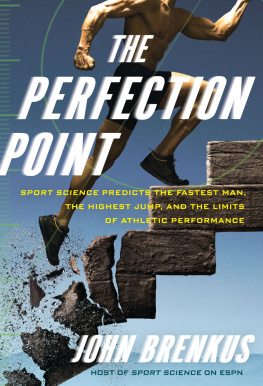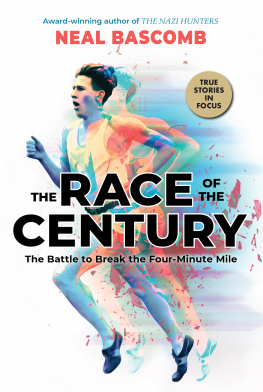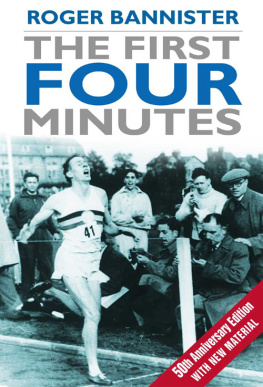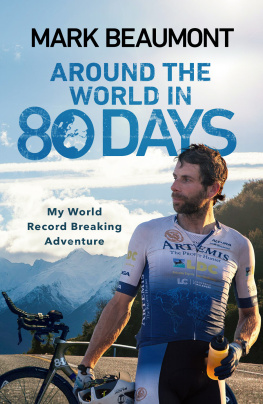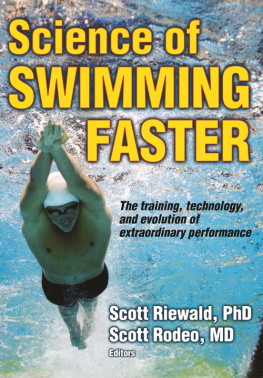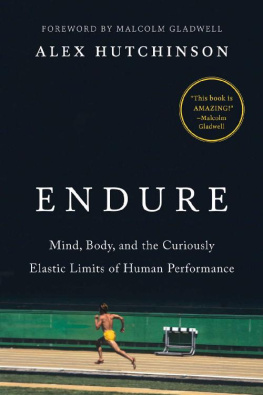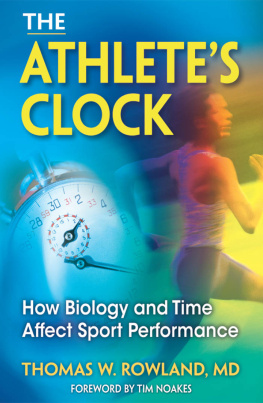Introduction
Finding the Limits
Are there absolute limits in sports?
Is there some speed no runner will ever exceed? A home-run distance no batter will ever reach? A weight no power lifter will ever hoist above his head, even a thousand years from now?
Its a natural human instinct to wonder about limits, especially our own. At various points in your life you probably tested yourself, for no other reason than to see what you were capable of. Maybe you stood on a driving range and hit a golf ball with everything you had, not worrying too much about the direction, just the distance. Maybe you trained for a marathon, just one, to see if you could finish, and once you knew you could, you did another to see if you could do it faster.
It doesnt have to be a physical activity, either. Maybe you time yourself when doing the Sunday crossword, hoping to beat your best. Whatever it is, at some point you probably wondered how well its possible for anyone to do it.
Its easy enough to find out, and usually pretty impressive when you do. The longest golf drive on record is a 458-yard monster by Jack Hamm at Highlands Ranch, Colorado, in 1993. The fastest marathon was turned in by the Ethiopian legend Haile Gebrselassie in Berlin in 2008. His time over the 26.2-mile course was a blistering 2:03:59. (Stanley Newman holds the world record for the fastest completion of a New York Times crossword under Guinness Book conditions2 minutes and 14 secondsbut were going to stick with more athletic pursuits from here on.)
Impressive, to be sure, but this doesnt really answer the question we posed. World records tell us how well people have done; they dont tell us how well they can do. Gebrselassies 2008 marathon is spectacular, but it isnt the best that will ever be run. We know that because every sports record gets broken sooner or later.
But where does it end? Does it ever end? Is there a limit to how fast its possible to run the marathon or how far one can hit a golf ball?
Until 1954, many people thought that a sub-four-minute mile was impossible for human physiology. The species just wasnt engineered to do it. This was considered practically an axiom, an absolute truth, right up there with believing that the earth was flat. For years, the record hovered around 4:02.
But one day at Oxford Universitys Iffley Road Track, with the wind so bad he almost withdrew from the race, Roger Bannister clocked a mile in 3 minutes, 59.4 seconds. He only broke the barrier by six tenths of a secondslightly more than an eyeblinkbut he changed the world of foot racing forever.
Was Sir Roger a fluke? Some sort of one-off freak of nature?
Maybe... for a little over a month. It took 190,000 years of human evolution to produce a runner capable of covering a mile in under four minutes. It took only forty-six more days to produce another one who outran him. In the next three years, runners went under four minutes 18 times, and within ten years, 336 people had done it.
Why? Because Bannister proved it was possible. Once athletes knew they could do it, they did it, in droves and ever faster, each new record becoming just another obstacle to overcome.
Thats not a new insight. Its practically a law of nature. People have been waxing lyrical about human potential since philosophers and poets first carved their thoughts into rocks. Every time someone declares that we can go no faster, no higher, no farther, someone else comes along to prove him wrong and leaves the doubter regretting his foolishness.
The fabled Ironman triathlon consists of a 2.4-mile ocean swim, 112 miles on the bike over the lava fields of Kona, Hawaii, topped off by a full marathon of 26.2 miles. The first time that sports magazine publisher Bob Babbitt raced, he brought a sleeping bag, and he remembers picking up a newspaper from somebodys lawn the morning of the second day and reading the results of a race he was still in. Gordon Haller won with a time of 11:46:58. The following year, Tom Warren bettered that time by over half an hour, winning in 11:15:56, and talk about breaking eleven hours was the big buzz in Hawaii. Less than twenty years later, talk has turned to breaking eight hours; Belgian Luc van Lierde came within four minutes of doing that in 1996.
It never seems to end. The world record for the mile today is 17 seconds faster than Sir Rogers breakthrough time, and even high school kids are running it in under four minutes. Ever try to hold your breath underwater when you were a kid? Among my friends, you were pretty good if you could go 45 seconds before popping your head up, gasping, to find out your time. Bill Graham, a retired United Airlines pilot living in Kailua-Kona, Hawaii, is the current U.S. record holder in breath holding, known as static apnea. His time was 7 minutes, 21 seconds.
But there are limits. There have to be, at least until we evolve into a different species altogether. If we agree that a man will never lift a Volkswagen over his head, then logic demands that there is something lighter than a Volkswagen that he also cant lift. And something lighter than that. At some point we cant say that anymore. Do we know where that point is?
We can agree that a human will never run at 60 miles per hour on his own two feet. He wont run at 59 mph either, or 58. Were on safe ground ruling those numbers out, and it doesnt take a lot of analysis or insight to do that. But is 28 mph possible? Almost certainly. The current world record is 27, so its not much of a leap to imagine that one more mile per hour is possible. How about 29? Probably, and wed be shortsighted to declare that 30 is completely out of the question. But somewhere between 30 and 58, theres a point at which we can go no faster. Is it possible to figure out that perfection point, the speed we can get closer and closer to but never exceed?
The reasons for limits differ from sport to sport. A weightlifters tendons are going to tear at some point even if his muscles are strong enough. The realities of muscle strength versus weight place an upper bound on the sprinter. Simple physics dictates the highest high jump or pole vault.
The reason for the limits may vary, but there will always be reasons why there are limits.
Thats what this book is about: finding the ultimate limits of human performance. Not the safe numbers like running 60 mph or lifting a 2,300-pound car, but the perfection points we can edge closer to yet never surpass.
In other words, were going to be as risky and perhaps as foolish as all those other naysayers who slapped limits on human performance and came to regret it. Of course, we think were different. We know more than we did then, not just about science but about athletes. Were also acutely aware of how badly each new generation breaks the marks set by the old, even sacred records like 61 home runs in a season.
Our method is simple in concept: For each activity, well start with the current world record and use some science to figure out how much better its possible to get. Its a little more difficult in practice, but have no fear: Were not going to use any jargon or fancy equations to get to the answers. If you can use e-mail or know how to store a number in your cell phone or can manage to record a television program correctly three times out of five, youll sail through this book. (Incidentally, a three-out-of-five success rate at recording TV programs is far higher than any baseball player in history has ever had at hitting.)
Well also give our vision for how these perfection points might be attained in the distant future, offering circumstances and conditions that lead to the best the human race can achieve. Its worth pointing out that not every one of these perfection points will be accomplished under the glare of cameras amid a media frenzy. Sport and skill have many different uses, and when it comes to perfection, sometimes the absolute best is simply what is needed to ensure survival. Ultimately, thats why the human body makes it possible.

